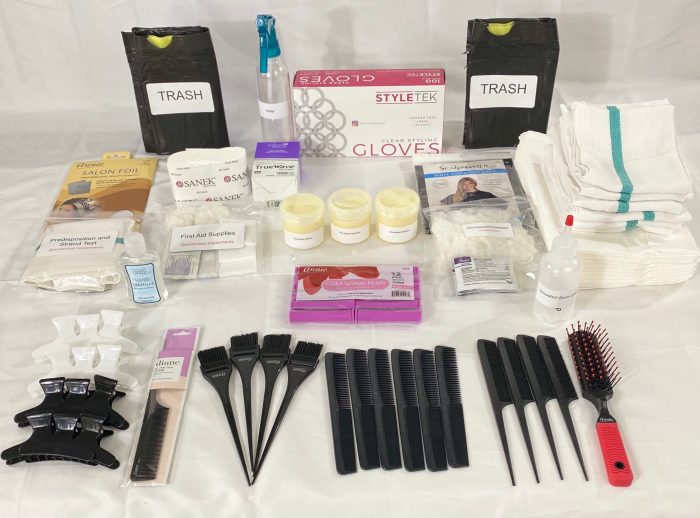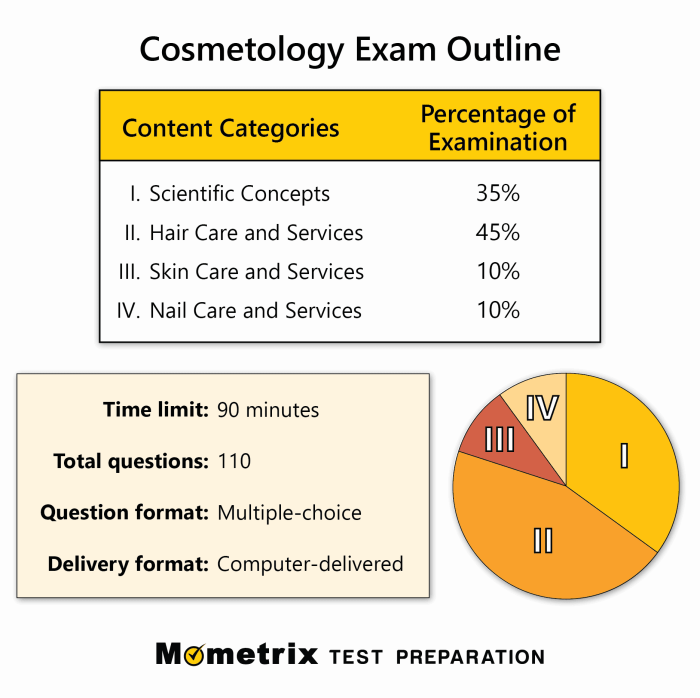Examen teórico examen de cosmetologia, a pivotal assessment in the field of cosmetology, demands a comprehensive understanding of the subject’s fundamental concepts and theories. This guide delves into the purpose, structure, and key topics covered in a theoretical exam in cosmetology, providing valuable insights and strategies for effective preparation and successful performance.
Embarking on this journey, students will gain a deeper comprehension of the principles governing cosmetology, equipping them with the knowledge and skills necessary to excel in their theoretical exam and beyond.
Theoretical Exam in Cosmetology
A theoretical exam in cosmetology is a written assessment that evaluates a candidate’s knowledge and understanding of the theoretical aspects of cosmetology.
The structure of a theoretical exam in cosmetology typically includes multiple-choice questions, true/false questions, and short answer questions. The exam covers a wide range of topics, including:
Topics Covered in a Theoretical Exam in Cosmetology
- Cosmetology theory
- Hair care and styling
- Skin care and makeup
- Nail care
- Salon management
- Business practices
Tips for Preparing for a Theoretical Exam in Cosmetology
To prepare for a theoretical exam in cosmetology, candidates should:
- Study the course materials thoroughly.
- Take practice exams to familiarize themselves with the format and content of the exam.
- Attend review sessions or workshops offered by the cosmetology school.
- Form study groups with other students.
- Get a good night’s sleep before the exam.
- Arrive at the exam on time and be prepared with all necessary materials.
Exam Content

A theoretical exam in cosmetology assesses students’ knowledge of the fundamental concepts and principles that underpin the field. To succeed, students must possess a comprehensive understanding of the science, techniques, and theories that govern cosmetology practices.
Key Concepts and Theories
Key concepts and theories that students should be familiar with include:
- Skin anatomy and physiology:Structure, function, and health of the skin.
- Hair structure and growth:Types, anatomy, and growth cycle of hair.
- Nail anatomy and disorders:Structure, growth, and common nail disorders.
- Cosmetics and their applications:Ingredients, formulations, and uses of cosmetics.
- Infection control and sanitation:Principles and practices to prevent the spread of infections.
- Client consultation and communication:Techniques for effectively communicating with clients.
- Ethics and professionalism:Ethical guidelines and professional conduct in cosmetology.
Types of Questions
Theoretical exams in cosmetology typically include various types of questions, such as:
- Multiple choice:Selecting the correct answer from a list of options.
- True/false:Determining whether a statement is true or false.
- Short answer:Providing brief, concise answers to specific questions.
- Essay:Writing a structured response that demonstrates understanding of a topic.
Importance of Understanding Principles
A deep understanding of cosmetology principles is crucial for success on a theoretical exam. By grasping the underlying principles, students can:
- Analyze and interpret complex information:Understand the relationships between different concepts.
- Apply knowledge to practical situations:Use principles to guide decision-making and problem-solving.
- Anticipate and address potential challenges:Identify potential issues and develop strategies to overcome them.
Exam Preparation

Preparing for a theoretical exam in cosmetology requires a comprehensive approach that includes effective study techniques, resource utilization, and a well-structured schedule.
To maximize their preparation, students should follow a step-by-step guide that involves identifying exam content, gathering study materials, creating a study schedule, and practicing exam-like questions.
Resources and Materials
Students should utilize various resources to enhance their understanding of cosmetology concepts. Textbooks, online resources, and industry publications provide valuable information and insights.
- Textbooks: Cosmetology textbooks provide a comprehensive overview of the subject matter, covering fundamental principles and advanced techniques.
- Online Resources: Websites, blogs, and online courses offer supplemental information, interactive content, and practice questions.
- Industry Publications: Trade magazines and journals keep students updated on the latest industry trends, techniques, and product developments.
Study Schedule
Creating a dedicated study schedule is crucial for effective exam preparation. Students should allocate sufficient time for studying, considering the exam date and the amount of material to be covered.
- Time Allocation: Determine the total study hours required and divide them into manageable blocks of time.
- Prioritization: Focus on understanding core concepts and allocate more time to challenging topics.
- Breaks: Incorporate short breaks throughout the study sessions to maintain focus and prevent burnout.
Exam Techniques

Effective exam techniques are essential for success in a theoretical exam in cosmetology. These techniques include strategies for answering different types of questions, efficient time management, and avoiding common mistakes.
To excel in the exam, it is crucial to understand the various question formats and employ appropriate answering strategies. Multiple-choice questions require careful consideration of all options before selecting the best answer. True/false questions demand a clear understanding of concepts and the ability to identify correct or incorrect statements.
Short answer questions test knowledge of specific facts or concepts, while essay questions assess the ability to organize thoughts, articulate ideas, and support arguments.
Time Management
Time management is of utmost importance during a theoretical exam in cosmetology. Allocate time wisely, ensuring sufficient time for each question and avoiding spending excessive time on any single question. It is advisable to start with questions that you are most confident in, as this can boost confidence and reduce anxiety.
If time permits, revisit unanswered questions later.
Common Mistakes to Avoid, Examen teórico examen de cosmetologia
| Mistake | Description |
|---|---|
| Lack of Preparation | Failing to study and review the exam material thoroughly can lead to poor performance. |
| Poor Time Management | Spending too much time on one question or failing to allocate time effectively can result in unanswered questions. |
| Rushing | Attempting to answer questions too quickly can lead to errors and incorrect answers. |
| Guessing | Answering questions without sufficient knowledge is a risky strategy that can result in incorrect answers. |
| Not Reading Instructions Carefully | Failing to understand the instructions for each question can lead to answering incorrectly. |
Exam Evaluation: Examen Teórico Examen De Cosmetologia
Evaluating a theoretical exam in cosmetology involves assessing students’ knowledge and understanding of the subject matter. The criteria used to evaluate such exams typically include:
Accuracy and Completeness
- Verifying the correctness of the answers provided by students.
- Ensuring that students have provided comprehensive responses covering all aspects of the question.
Clarity and Organization
- Assessing the clarity and organization of the answers, ensuring logical flow and ease of understanding.
- Evaluating the use of appropriate terminology and specific examples to support the answers.
Depth of Knowledge
- Determining the depth of students’ knowledge by evaluating their ability to analyze and synthesize information.
- Assessing their understanding of the underlying principles and concepts related to cosmetology.
Critical Thinking
- Evaluating students’ ability to apply critical thinking skills to solve problems and make informed decisions.
- Assessing their capacity to analyze data, draw inferences, and support their arguments with evidence.
Student Improvement
Providing students with feedback on their theoretical exam performance is crucial for their future improvement. This feedback should highlight areas where they excelled and identify areas for growth. By understanding their strengths and weaknesses, students can develop strategies to enhance their knowledge and skills.
Importance of Feedback
- Feedback allows students to identify gaps in their understanding and target specific areas for improvement.
- It provides guidance on how to approach future exams and assignments more effectively.
- Feedback fosters a growth mindset, encouraging students to continuously improve their knowledge and skills.
Query Resolution
What is the purpose of a theoretical exam in cosmetology?
A theoretical exam in cosmetology assesses students’ knowledge and understanding of the fundamental concepts and theories that underpin the practice of cosmetology.
What are some common topics covered in a theoretical exam in cosmetology?
Common topics covered in a theoretical exam in cosmetology include skin care, hair care, nail care, makeup application, and salon management.
How can I prepare for a theoretical exam in cosmetology?
Effective preparation for a theoretical exam in cosmetology involves studying the course materials, attending classes regularly, practicing answering exam-style questions, and seeking guidance from instructors or tutors.